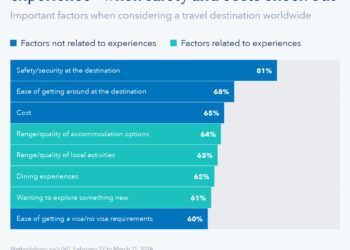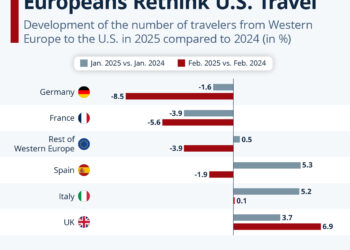The Global Landscape of Travel Regulations and Their Impact on Travelers
As travel gradually returns to pre-pandemic levels, various countries are introducing new regulatory measures to enhance border security and streamline the entry process for international visitors. Recent developments, particularly within the United Kingdom, showcase an evolving landscape marked by requirements such as the Electronic Travel Authorization (ETA). This blog explores the nuances of these regulations and how they influence travelers’ planning behaviors across different countries.
Electronic Travel Authorization (ETA) in the UK
In a significant move aimed at bolstering border security, the United Kingdom has announced the implementation of an Electronic Travel Authorization (ETA) system. Starting from April 2, 2024, travelers from the European Union (EU) will be required to obtain an ETA before their arrival in the UK. This initiative mirrors the U.S.’s Electronic System for Travel Authorization (ESTA) and is designed to simplify the arrivals process while ensuring necessary security checks are in place.
Objectives of the ETA System
The primary objectives of the ETA system are:
- Enhancing Security: By requiring pre-travel authorization, the UK aims to better assess the eligibility of visitors before they arrive.
- Streamlining Entry: The electronic system is expected to reduce processing times at borders, making arrival smoother for travelers.
- Monitoring Travel Trends: Implementing such regulations enables governments to gather data on who enters their country, which can be pivotal for policy formulation and risk assessment.
Global Attitudes Toward Travel Regulations
As countries modernize their entry regulations, there’s a critical question: How do these requirements influence travelers’ decisions? A recent survey by Statista Consumer Insights in 2024 reveals intriguing insights into traveler behavior across various nations.
Survey Findings on Travel Adjustment Based on Regulations
The survey indicates a notable variance in how travelers from different countries adjust their plans based on travel requirements:
- India: A significant 33% of respondents stated they modify their travel plans due to regulations, highlighting a proactive approach towards compliance.
- United Kingdom: At 20%, the UK sits in the middle range, where travelers are somewhat cognizant of these requirements but aren’t drastically altering their plans.
- Germany and France: With responses of 16% and 14% respectively, travelers from these countries show a lower tendency to change their travel intentions based on regulations.
- Japan: Interestingly, Japan reported the lowest percentage, with only 7% of respondents indicating they reconsider their travel plans in light of entry requirements.
The Implication of Travel Regulations on the Tourism Industry
The disparity in traveler responses can significantly influence the tourism industry:
- Destination Marketing: Countries with more flexible regulations may have an edge in attracting international tourists, especially those who are hesitant about compliance hurdles.
- Travel Agency Operations: Agencies need to be well-versed in the various entry requirements to advise their clients effectively and facilitate seamless travel experiences.
- Traveler Confidence: Providing clear, concise, and updated information about entry regulations can bolster traveler confidence. Countries perceived as friendly and accommodating may thrive in attracting more visitors.
Regional Differences in Travel Regulation Sensitivity
The traveler statistics outlined reveal regional differences in how people view and react to entry requirements. Understanding these distinctions can help the tourism sector tailor its offerings and communication strategies accordingly.
Countries Most Impacted by Regulations
India’s high percentage of travelers altering their plans could be attributed to factors such as:
- Highly Regulated Environment: Indian travelers often face multiple bureaucratic hurdles; thus, they may be more attuned to how regulations influence their travel experiences.
- Risk Aversion: Concern over governmental policies may make these travelers more cautious, prompting them to reassess their plans when new regulations are introduced.
The Japanese Perspective
In stark contrast, Japan’s low percentage may suggest a level of confidence in the travel system or a cultural tendency to accept regulations without major re-evaluations of travel plans.
Conclusion
The introduction of systems like the ETA in the UK, alongside varying responses from travelers in different countries, creates a complex web of factors influencing international travel. As governments implement these regulations and travelers adjust accordingly, the overall landscape of global travel continues to evolve, shaping how we think about tourism and the barriers that may sway travel decisions.






